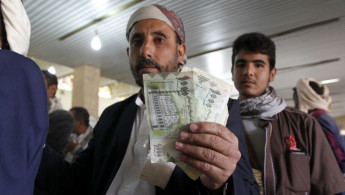Cash crisis exposes Yemeni rift with UAE military intervention
Both the government and the alliance are at war with Houthi rebels, who control much of northern Yemen, including the capital, Sanaa. But the UAE is believed to be at odds with President Abed Rabbo Mansour Hadi over his embrace of a local affiliate of the Muslim Brotherhood group, and fighters loyal to the two sides have clashed in recent months.
In a strongly worded statement issued on Sunday, Central Bank Governor Mansr al-Qaiti, who was appointed by Hadi, accused the coalition of having banned 13 flights carrying money printed in Russia to the southern city of Aden, where the government is based, since April. He accused the coalition of "strangling the Yemeni economy" and denying it "needed liquidity".
For the past two years, Hadi's government has been confined to Aden. As the Saudi-led coalition waged an aerial campaign against the Houthis and their allies, the UAE has established a military footprint across the south, partnering with local allies.
In the central city of Taiz, fighters allied with the Emirates have battled others aligned with Hadi's government, despite the city being under siege by the Houthis for the past two years.
 |
At the heart of the dispute is Hadi's alliance with the Islah party, the Yemeni branch of the Muslim Brotherhood |  |
At the heart of the dispute is Hadi's alliance with the Islah party, the Yemeni branch of the Muslim Brotherhood, a pan-Arab organisation that the UAE and other Gulf countries view as a threat.
The wrangling began when Hadi removed his one-time vice president and prime minister, Khaled Bahah, who was seen as an advocate of reconciliation with the Houthis and who was backed by the UAE. Hadi replaced him with Ali Mohsen al-Ahmar, a powerful military commander who is closely linked to Islah.
At a recent meeting with Yemeni tribal leaders in the Saudi capital, Riyadh, Hadi accused the Emiratis of "dictating" candidates for security and military posts, according to two tribal leaders and a security official who attended the gathering.
 |
|
| Half a million cholera cases have been reported in Yemen; its infrastructure devastated by three years of war [Getty] |
Hadi said he used to comply with UAE wishes, but began to oppose them after their "meddling crossed all lines", including attempts to remove Islah figures from the government and military, the attendees said.
Hadi said he complained to the Saudis, who have led the intervention on behalf of his government, but received no response, according to the attendees, who agreed to discuss the closed-door meeting on condition of anonymity.
On Monday, Middle East Eye revealed that Mohammed bin Salman, the heir to the Saudi throne, confessed to two former US officials he "wants out" of the brutal two-year war he started in Yemen, and added that he was "okay" with Washington engaging with his arch-foe, Iran.
The revelation came partly from the leaked emails of UAE ambassador to Washington Yousef Otaiba.
Yemen's war has killed more than 10,000 civilians, displaced three million people, and pushed the country to the brink of famine.
An outbreak of cholera has killed hundreds, and more than half a million cases have been counted. Half the country's health facilities are out of service, including many that were bombed by the coalition. Government workers, including medics and refuse collectors, have not received their salaries in nearly a year, further hindering efforts to combat the outbreak.
Follow us on Twitter: @The_NewArab



